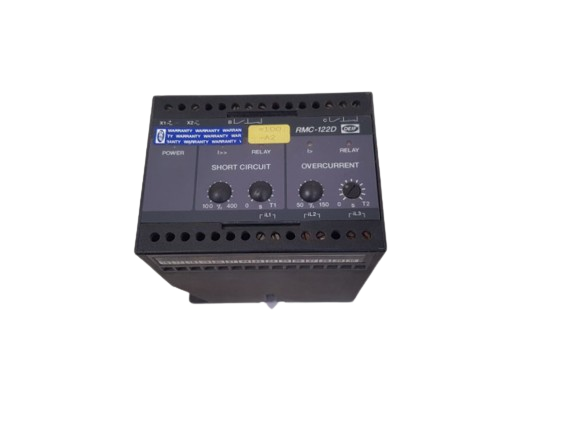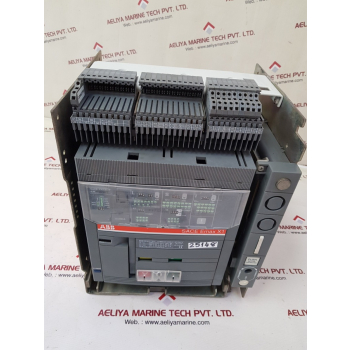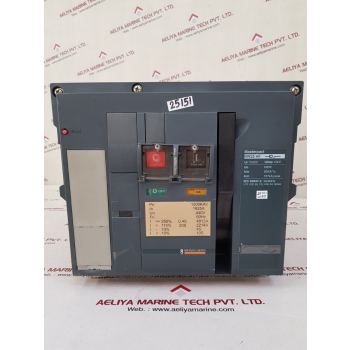Industrial circuit breakers are essential in high-voltage environments and serve a similar function to their domestic counterparts but with unique capabilities. Electrical safety protection devices are important in safeguarding equipment and personnel against electrical hazards in industrial setups, ensuring seamless operations. When selecting a circuit breaker for industrial activities, it's crucial to keep several factors in mind, including electrical capacity and voltage ratings as well as environmental conditions, in order to achieve maximum performance and safety. We will cover the significance and varieties of industrial circuit breakers in this blog, along with important considerations when choosing one from among several available circuit breakers to enhance industrial operations and protect assets.
What Is an Industrial Circuit Breaker?
Industrial circuit breakers are electrical devices designed to immediately stop the flow of electricity when there is an open short circuit, overload or ground fault condition. As essential components in electrical systems, these breakers protect equipment from potential hazards like fires, electric shocks or damage from occurring. While residential home circuit breakers protect only appliances located within homes themselves; industrial breakers are designed for larger currents and voltages often found in industrial operations - offering more versatility across many different industries and their operations. They come in various sizes and types to suit varied industry requirements.

Circuit breakers consist of multiple essential components, including contacts, the trip unit and an operating machine. While contacts open and close the circuit, the trip unit monitors electrical conditions in real-time to detect overload or short circuiting and trigger the breaker's shutdown in such cases. Not only are circuit breakers used to protect electrical systems from overload or short circuiting but industrial circuit breakers can help improve reliability and efficiency too!
Common Types of Industrial Circuit Breakers
Industrial circuit breakers come in various varieties. Examples include:
1. Molded Circuit Breakers(MCCBs) : MCCBs are compact devices that encase all their equipment within an insulated case, making them flexible and robust in industrial contexts. Offering thermal and magnetic protection if current exceeds safe limits, MCCBs have become well-known due to their dependability, effectiveness and easy setup process.
2. Air Circuit Breakers(ACBs) : ACBS are ideal for applications involving high currents, providing exact protection and making heavy-duty industrial environments much less demanding. More efficient than other circuit breaker options available today, ACBs are commonly installed into heavy-duty equipment to deliver reliable power to its users.
3. Oil Circuit Breakers: While less common today, oil circuit breakers were once widely employed in high-responsibility industrial applications. Utilizing oil as an agent for quenching arcs as they form, these breakers provided outstanding performance in high voltage environments.
4. Vacuum Circuit Breakers(VCBs): Vacuum circuit breakers are known for their fast response times and low maintenance requirements, making them suitable for medium-to-high voltage applications. By creating a vacuum to snuff out arcs, they offer reliability with minimal upkeep costs - ideal for industrial systems.
5. Sulphur Hexafluoride(SF6) Circuit Breakers: These circuit breakers are most often employed in medium voltage applications and use gaseous Sulphur Hexafluoride as an extinguishing medium against arcs. While highly effective, their use has gradually decreased due to environmental concerns and is being phased out due to technological developments. They're known for their disruptive capacity as well as insulation properties.
6. Miniature Circuit Breakers(MCBs): Miniature Circuit Breakers are specifically designed to protect electrical circuits against overload. They're ideal for protecting low voltage circuits as they're durable, cost-effective and small in size.
Importance of Industrial Circuit Breakers
Industrial circuit breakers are essential in ensuring electrical systems are both safe and reliable. Here's why they're so important in industrial setups:
1. Protection against Damages of Equipments
Industrial machines and other electric appliances are relatively expensive to buy, and the cost of replacement or repair is very high. Circuit breakers prevent short circuits, power surges, or overload conditions from damaging equipment. Thus, circuit breakers save costs on repair and replacement. Without circuit breakers, electrical systems would crash catastrophically, thus leading to downtime and other costs.
2. Safety in the Workplace
Electrical faults cause the possibilities of fire, electrocution, and other hazardous conditions. An industrial circuit breaker protects the working personnel by cutting off the power supply during the fault condition; therefore, they minimize the probabilities of electrical shock or fire. This makes it safe for the employees working in the space and also all the safety regulations regarding the electrical system are followed.
3. Prevention of Fire
This prevents heating conditions arising due to overloading, or even more seriously short circuits in the circuit and resultant fire situations, thus putting an end to their breakout. Actually, an industrial circuit breaker extremely fast can also sense the fault and hence the power to such conditions. Man-lives as well as other crucially vital tools are saved.
4. Shutdown Avoidance
This will lead to downtime since most operations depend on this power continuity. This is because circuit breakers prevent such events by quickly detecting faults and avoiding further damage to the electrical systems thus allowing a return to operation within a short period after rectification of the fault.
Working of Industrial Circuit Breakers
Industrial circuit breakers are essential components of electrical systems that protect devices against electrical faults. They detect irregular currents and interrupt their flow before any potential damages occur, using electromagnetism and thermal protection principles as their basis. When an irregular current is detected - for instance as short circuit protection - then these circuit breakers will trip immediately by interrupting its flow, safeguarding circuits against being damaged while simultaneously ensuring operational safety and longevity of equipment.
Finding the Ideal Circuit Breaker
Selecting an effective industrial circuit breaker involves considering several criteria, such as voltage requirements, capacity ratings and current ratings as well as environmental considerations and regulations. Furthermore, choosing an appropriate brand ensures durability, reliability and performance.
Considerations When Selecting Circuit Breakers:
1. Capacity and Voltage Ratinguiesc: The selection of appropriate voltage and current ratings circuit breakers is vital in ensuring they work optimally with industrial machinery and operational conditions.
2. Considerations of Environmental Factors: Environmental considerations such as temperatures, humidity levels, dust particles and chemical exposure must all be factored into the decision process when selecting circuit breakers suitable for industrial settings.
3. Maintenance Requirements: Routine inspection and maintenance are vital in order to maximize performance and reliability from industrial circuit breakers, ensuring they remain operational at all times.
Key factors to keep in mind when selecting the appropriate circuit breakers from top brands
1. ABB Circuit Breakers: ABB circuit breakers are widely respected for their reliability and durable construction, guaranteeing uninterrupted operation. ABB provides advanced features such as digital monitoring/communication capabilities that add intelligence to their systems.
2. Schneider Circuit Breakers: provide solutions for various applications with its extensive portfolio. Incorporating seamlessly with other Schneider electric components for smooth installations and maintenance.
3. Merlin Gerin Circuit Breakers: Merlin Gerin emphasizes safety features to provide protection from electrical hazards and minimize risks, with their breakers standing up well against industrial conditions. Merlin Gerlin consistently invests in research and development and introduces innovative solutions that meet ever-evolving industrial needs.
4. Mitubishi Circuit Breakers: employ advanced technologies to maximize performance and durability, offering customized solutions customized to meet specific industrial requirements for an adaptable solution.
5. Siemens Circuit Breakers: stands at the forefront of technological innovation, creating advanced features and solutions for industrial applications. Their circuit breakers undergo extensive tests to ensure performance under various operating conditions; furthermore, all Siemens products are built for interoperability with industrial automation.
Industrial circuit breakers are an integral component of electrical systems, protecting them from short circuiting or overload. In the realm of industrial automation, knowing the most commonly used kinds of industrial circuit breakers and selecting one suitable for your requirements based on environmental considerations and reliability considerations are dominant to the success of any business . Auto2mation offers reliable modern circuit breakers from leading brands such as Siemens, Allen-Bradley, Tosibha and ABB which help ensure you choose a breaker which works effectively for you.






Validate your login
Sign In
Create New Account